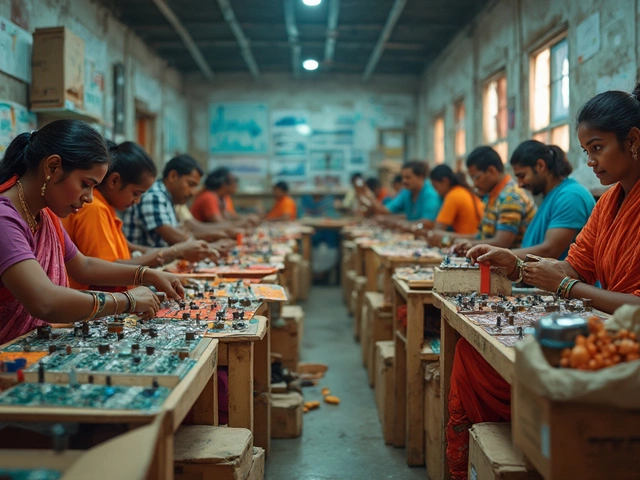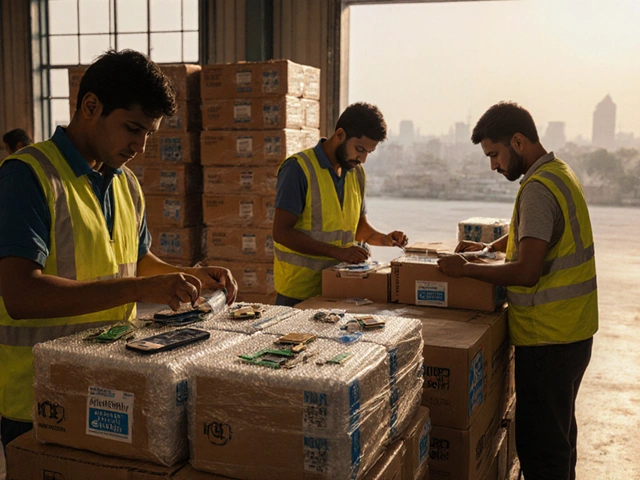India's pharmaceutical scene is like a vibrant tapestry, with each company adding its own unique thread. But why is this important? Well, the Indian pharma industry isn't just about producing medications for its massive population; it's a global powerhouse, shipping life-saving drugs across the world. Whether you're an investor, a healthcare professional, or simply someone curious about where your pills come from, understanding the top players in this field is key.
Let's kick things off by taking a look at the leading pharma companies shaping this industry. We're talking about the top 10, the big guns who are setting trends and driving innovations. These companies are not just prominent within India, but many of them have carved out impressive legacies worldwide, contributing significantly to global healthcare solutions.
As we explore these industry giants, you'll discover some intriguing tidbits—like how some of these companies started their journey from humble beginnings to becoming major forces on the global stage, pushing the boundaries of healthcare research and production. Ready to dive into the landscape of Indian pharma giants and uncover what makes them tick? Let's get started!
- Overview of India's Pharma Sector
- Profiles of Top 10 Pharma Companies
- Unique Contributions of Each Company
- Market Trends and Innovations
- Global Impact and Future Prospects
Overview of India's Pharma Sector
India's pharma companies are like the heartbeat of the nation's healthcare system, and they're doing more than just keeping folks healthy inside the country's borders. Thanks to its ability to produce high-quality drugs at low costs, the Indian pharmaceutical industry is a critical player in global health care.
You might find it intriguing that India produces over 20% of the world's generic drugs. That's a big deal! This means cheaper medicines for everyone, making treatments for chronic diseases more accessible worldwide. Imagine getting quality medication at a fraction of its usual cost—it's no wonder India's pharmaceutical sector is in high demand overseas.
And who runs this show? It's not only the top pharma companies but also thousands of smaller firms working behind the scenes to develop everything from antibiotics to complex biologics. The Indian government plays an encouraging role, too, by creating a friendly environment for pharmaceutical research and development. This approach has catalyzed innovation and a surge in pharmaceutical exports.
Take a peek at the stats below for a better grasp of how vast and dynamic this sector is:
| Characteristic | Details |
|---|---|
| Total Market Size | Over $41 billion as of 2023 |
| Exports | $24 billion in exports covering 200+ countries |
| Employment | Over 3 million people employed directly or indirectly |
In summary, the Indian pharmaceutical industry is not just about business. It's about a commitment to global healthcare, providing quality and affordable medications wherever they're needed most. Sounds impressive, right? Stay tuned as we delve into the companies that drive this thriving sector.
Profiles of Top 10 Pharma Companies
Diving into the world of Indian pharmaceuticals, you'll find some big names making huge waves both locally and internationally. Here’s a closer look at these top pharma companies and what sets them apart.
- Sun Pharmaceutical Industries Ltd: It's the heavyweight champ in the Indian pharmaceuticals, taking the top spot with its vast range of products that include generics and specialty medicines. It’s known for its innovation in chronic therapies.
- Cipla Ltd: Famous for respiratory drugs, Cipla is a household name. Their focus on affordable, accessible medicine has made them a staple in both domestic and global markets.
- Dr. Reddy’s Laboratories: From producing affordable generics to cutting-edge biosimilars, Dr. Reddy's has been a game-changer. They're renowned for their strong research emphasis.
- Lupin Ltd: Specializing in generics, branded formulations, and APIs, Lupin is a top contender, especially in the anti-infectives space. They've got a knack for cardiovascular and diabetes medications too.
- Aurobindo Pharma: Known for its vast range of medicines, Aurobindo is a global powerhouse in generics, especially antibiotics, and antiretrovirals.
- Biocon Ltd: A pioneer in biopharmaceuticals, Biocon stands out for its work in biologics and specialty drugs like insulin and biosimilars.
- Glenmark Pharmaceuticals: By delving into dermatology, respiratory, and oncology, Glenmark has carved a niche, particularly in innovative drug formulations.
- Torrent Pharmaceuticals: This company's focus on building a strong portfolio in cardiology, central nervous system, and gastroenterology products has paid off well.
- Zydus Cadila: Besides generics, they've made strides in vaccines and biologics, with their efforts in the COVID-19 vaccine being noteworthy.
- Alkem Laboratories: Known for anti-infectives and nutraceuticals, Alkem balances its Indian roots with a strong international presence.
Amazing line-up, right? Most of these companies started small and have grown thanks to a mix of smart strategy and relentless innovation. They don’t just operate big factories; they manage complex global networks that deliver health solutions to millions. Plus, these pharma manufacturers are key to India's reputation as the 'pharmacy of the world.' Their efforts ensure that essential drugs are both available and affordable.

Unique Contributions of Each Company
Diving into India’s pharma industry, you'll find a lineup of companies that are doing some seriously cool things. Each has carved out its niche, contributing uniquely to both the national and international markets. Let’s break down what makes each of them tick.
Sun Pharmaceuticals stands tall, not just in terms of revenue but also innovation. They're known for their robust research and development wing, focusing heavily on chronic diseases like diabetes and cardiology. Their generic medicines are a staple in many countries, offering affordable healthcare solutions.
Cipla kicks things up a notch with its dedication to accessibility. Cipla emphasizes making medicines affordable, especially for respiratory, HIV/AIDS, and pediatric care. Their commitment to treatment for every child on the block is unwavering.
Dr. Reddy's Laboratories is the go-to for complex generics. These guys have cracked the code on delivering alternatives to innovator products. They're also big on biosimilars, which are essentially drugs similar to already authorized biologic products, thus widening accessibility even more.
Aurobindo Pharma isn’t just making waves in India. It's one of the largest suppliers of APIs worldwide. They specialize in antibiotics and anti-retroviral treatments, forming a backbone for global medication supplies.
Lupin Limited is all about the next-gen stuff. They focus heavily on advanced therapies, working not just to treat symptoms but to truly improve quality of life for cardiac and central nervous system disorders.
Cadila Healthcare (Zydus Cadila) brings innovation via its vaccines. Remember that needle? They were key players in developing a vaccine for swine flu and are at the forefront of indigenous COVID-19 vaccine development.
Biocon takes biopharma to the next level. They’re all about biosimilars and technology-driven processes, which help in reducing global treatment costs, especially in diabetes and oncology.
Glenmark Pharmaceuticals prides itself on dermatology and respiratory care innovations. They're the folks who get excited about fancy inhalers and skin care solutions, pushing the boundaries in these niches.
Torrent Pharmaceuticals might be lesser known, but they pack a punch with cardiovascular care and central nervous system drugs. They thrive on strong research and delivering quality without breaking the bank.
Piramal Enterprises, although diversified, have a substantial stake in critical care. Their work in developing anesthetics is noted globally and widely used in surgeries. Piramal’s knack for turning complex problems into simple solutions is unmatched.
Each of these pharma companies in India brings something unique to the table, making India a pharmaceutical powerhouse. They create jobs, spark innovations, and most importantly, help millions heal. That's something worth tipping our hats to!
Market Trends and Innovations
If you've been keeping an eye on the Indian pharmaceutical sector, you'll know it's evolving at lightning speed. A key trend has been the massive shift toward research and development. Indian pharma companies are not just manufacturing medicines anymore; they're innovating new solutions to combat various diseases.
Take, for instance, the rising focus on biosimilars. These are basically cheaper versions of biological drugs that are becoming big business due to their potential to lower treatment costs significantly. Indian companies have jumped into this space, using their cost-efficient production methods to make a mark globally.
Another exciting trend is the embrace of digital health. Companies are leveraging technology for everything from improving drug discovery processes to enhancing patient engagement. You'll see apps, smart devices, and AI-driven analytics becoming commonplace in this industry as firms strive to improve outcomes and personalize treatments.
Here's an interesting bit: the export market is on fire! As of 2024, India was exporting pharmaceuticals to over 200 countries, making it a key player on the global stage. The demand for generic drugs worldwide is a driving force, with Indian manufacturers meeting the challenge with their robust manufacturing capabilities.
Oh, and sustainability is not just a buzzword anymore. With global pressures mounting around environmental responsibility, Indian pharma companies are stepping up efforts toward greener manufacturing processes. This shift is not only about saving the planet but also about meeting international regulations that have gotten stricter over the years.
| Year | Export Revenue (in Billion USD) |
|---|---|
| 2022 | 24.4 |
| 2023 | 28.1 |
| 2024 | 30.5 |
Tapping into these trends can give businesses a significant edge. Whether it's investing in tech innovations or finding ways to cut down carbon footprints, these moves are reshaping the landscape of Indian pharmaceuticals. And who knows, you might just be the witness to the next big breakthrough in healthcare coming out of these trends!

Global Impact and Future Prospects
India's pharma companies have gradually established themselves as leaders on the world stage. It's not just about the volume of production; it's about pioneering affordable healthcare solutions. Consider this: India supplies over 50% of the global demand for vaccines. Crazy, right? This impact is enormous, especially for developing nations where cost-effective healthcare is critical.
The ability of Indian companies to produce high-quality generic drugs also plays a huge role in reducing treatment costs worldwide. Thanks to players like Sun Pharma and Cipla, essential medications have become accessible to more people, improving global health outcomes.
Looking to the future, the potential is immense. Many Indian pharma giants are investing heavily in research and development, aiming to create innovative treatments for complex diseases. With advancements in biotechnology and personalized medicine, these companies are in a sweet spot for breaking new ground.
There's also been a growing trend of strategic partnerships between Indian pharma companies and international firms. These collaborations often focus on joint research projects, which combine local expertise with global resources, pushing the boundaries of what's possible in medicine.
However, it's not all smooth sailing. The Indian pharmaceutical sector faces challenges like regulatory hurdles and the need for maintaining ethical standards globally. But if there's one thing these companies have shown, it's resilience and adaptability.
As we look ahead, essential areas like biosimilars and novel drug delivery systems are expected to see significant growth. With ongoing support and investment, Indian pharma companies are poised to lead, shaping the future of healthcare for everyone. So, keep an eye on this dynamic industry—it's one to watch as it evolves and drives forward global healthcare standards.






